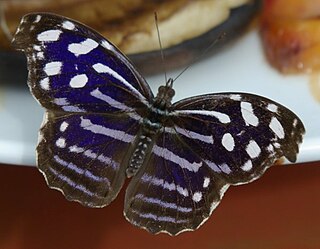
Biblidinae is a subfamily of nymphalid butterflies that includes the tropical brushfoots. This subfamily was sometimes merged within the Limenitidinae, but they are now recognized as quite distinct lineages. In older literature, this subfamily is sometimes called Eurytelinae.
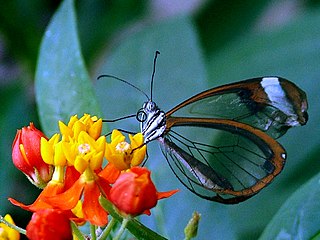
Greta is a genus of clearwing (ithomiine) butterflies, named by Arthur Francis Hemming in 1934. They are in the brush-footed butterfly family, Nymphalidae, and are found in Central America, South America, and the Caribbean.

Eunica is a genus of nymphalid butterflies found in the Neotropical realm.

Callicore is a genus of nymphalid butterfly found in the Neotropical realm. This genus, like some related ones, was formerly lumped together as the paraphyletic Catagramma assemblage.

Euptoieta is a genus of butterflies in the subfamily Heliconiinae found in the Neotropical ecological zone.

Podotricha is a genus of butterflies of the subfamily Heliconiinae in the family Nymphalidae.

Heliopetes is a Neotropical genus of spread-winged skipper butterflies in the family Hesperiidae.

Diaethria clymena, the Cramer's eighty-eight, is a species of butterfly of the family Nymphalidae. It is found from Mexico to Peru and Brazil. It was described to science by Pieter Cramer, in a fascicle of De uitlandsche Kapellen, 1775.
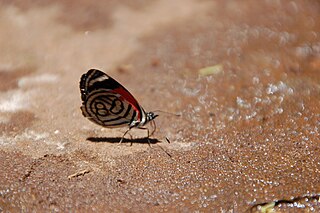
Diaethria candrena, the candrena eighty-eight or number eighty, is a species of butterfly of the family Nymphalidae. It is found in Argentina and Brazil.

Hesperocharis is a genus of butterflies in the family Pieridae. They are native to the Americas.

Oleria is a genus of clearwing (ithomiine) butterflies, named by Jacob Hübner in 1816. They are in the brush-footed butterfly family, Nymphalidae.
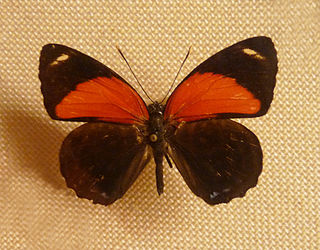
Catagramma pygas, the Godart's numberwing or pygas eighty-eight, is a species of butterfly of the family Nymphalidae. It is found in Venezuela, Guyana, Ecuador, Peru, Bolivia, Paraguay and the upper Amazonian region of Brazil.
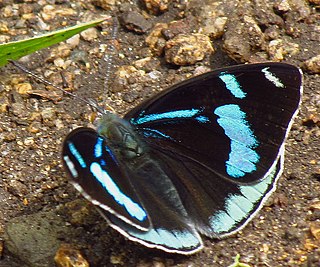
Perisama is a brush-footed butterfly genus found in the Neotropical realm, ranging from Colombia and Venezuela to Argentina.

Dynamine is a genus of nymphalid butterflies found in South America.
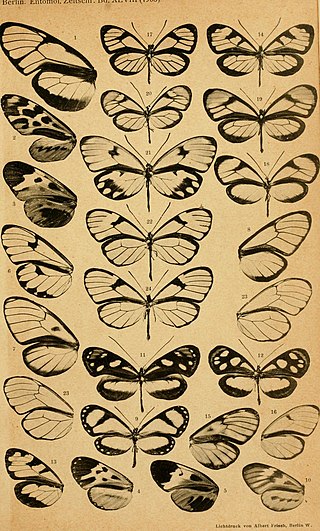
Napeogenes is a genus of clearwing (ithomiine) butterflies, named by Henry Walter Bates in 1862. They are in the brush-footed butterfly family, Nymphalidae.

Pteronymia is a genus of clearwing (ithomiine) butterflies, named by Arthur Gardiner Butler and Herbert Druce in 1872. They are in the brush-footed butterfly family, Nymphalidae.

Diaethria neglecta is a species of butterfly of the genus Diaethria. It was described by Osbert Salvin in 1869. It is found in Bolivia, Peru, Ecuador, Colombia and Venezuela. All Diaethria species are commonly called eighty-eights because of the patterns on the hindwing undersides.
Dysschema pictum is a moth of the family Erebidae first described by Félix Édouard Guérin-Méneville in 1844. It is found in Brazil.

Perisama bomplandii, or Bomplandi's perisama, is a butterfly belonging to the family Nymphalidae. The species was first described by Félix Édouard Guérin-Méneville in 1844.



















